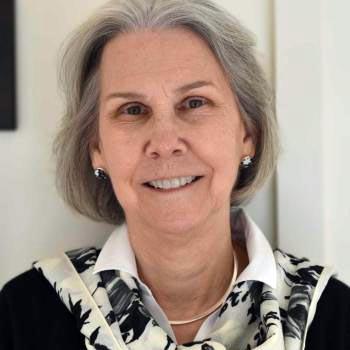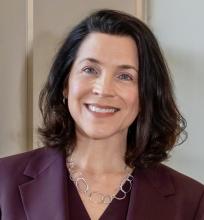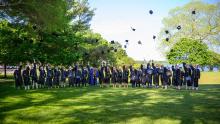
Julia King, professor of anthropology, was named to the George B. and Willma Reeves Endowed Chair in the Liberal Arts in recognition of her numerous accomplishments as a full-time professor at St. Mary’s College of Maryland. King’s term took effect at the start of the spring 2024 semester and runs through May 31, 2026.
Established in 1997, the Reeves Endowed Chair in the Liberal Arts recognizes “a distinguished scholar with broad expertise … an eminent scholar and gifted teacher who provides academic leadership.”
“The Reeves Endowed Chair is an important part of an array of fellowships because it supports our commitment to the humanities, " said Katie Gantz, vice president for academic affairs and dean of faculty.
King has 30 years of experience studying, writing and teaching about historical archaeology and Chesapeake history and culture. She began at St. Mary’s College as an associate professor in 2006 and received tenure in 2007. Her current research focus includes Indigenous history and colonialism in the Chesapeake region.
When she learned of her appointment, King said she was really surprised to have been chosen. “The Reeves Chair is a wonderful affirmation of the interdisciplinary work my students and I have been doing and that is really very meaningful to me, “ King said. “On a personal note, it really is an honor to serve in the Reeves Chair position because of the Reeves’ connection to St. Mary's County and Southern Maryland; the Reeves are well known for making the county a better place.”
King has held several leadership positions at St. Mary’s College including coordinator of the College's SlackWater Project; acting coordinator of the museum studies program; and chair of the department of anthropology and the recently combined departments of anthropology and sociology.
Her research is widely published and her book, “Archaeology, Narrative, and the Politics of the Past: The View from Southern Maryland,” received an Award of Merit from the American Association of State and Local History.
King has also won numerous accolades including the J.C. Harrington Award from the Society for Historical Archaeology to recognize a lifetime of scholarly achievement. From 2003 until 2011, King served as an expert member on the Advisory Council on Historic Preservation, a federal agency that advises the president and Congress on matters of national historic preservation policy.
Of all her achievements, King readily points to her work with students and work to dissolve distrust between Indigenous communities and anthropologists in Maryland and Virginia, as her most important. The two often intertwine as she directly involves students in her archaeology work.
Francis Gray, Piscataway Conoy tribal chair wrote of King, “I can attest to the fact that Dr. Julie King has been, for many years, an instrumental force in substantiating our unwritten cultural history due to her tireless archaeological work throughout our tribal homelands.”
Elizabeth Charlebois, professor of English, explained in her nomination letter that King is “the real deal,” and that her work as teacher and scholar aligns with the mission and identity of the National Public Honors College.
“The life-changing work that she does with our students affords them the opportunity to do truly extraordinary primary research that is embedded in our history and our landscape, " Charlebois said, adding that King has exemplified the College's Learning through Experiential and Applied Discovery (LEAD) initiative since its inception in 2018.
In a letter of support for her former professor, Caitlin Hall ’22 wrote, “Dr. King’s pedagogy expanded my understanding of the interconnectedness of the past with the present and taught me how to critically view the landscape around me through field trips that demonstrated real-life applications to what we were learning in class.”
Charlebois said that while King’s discipline is anthropology with a specialization in archaeology, her research and teaching straddle the humanities, the social sciences and the hard sciences and that her teaching is interdisciplinary.
The Reeves Chair is supported by an annual research stipend. King will be charged with delivering an annual campus lecture highlighting her scholarship within the humanities.



